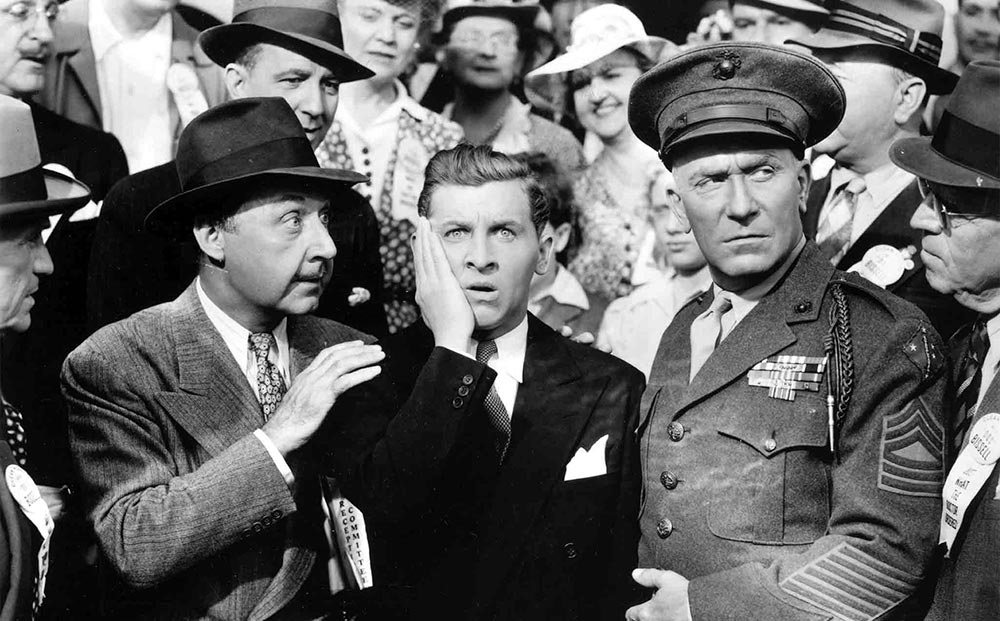The first joke of Preston Sturges’s Hail the Conquering Hero (1944) comes with Eddie Bracken’s billing card, a perfectly summative image for a film about mismatched pomp, patriotism, and (feigned) heroism: the actor’s doughy profile is rendered in marble, outfitted with the Corona Civica of emperors. As a young man from a small town in wartime America, Bracken’s Woodrow Truesmith is a far cry from Roman excellence. He’s been discharged prematurely from the Marines for chronic hay fever, an indignity of which he’s chosen not to inform his friends and family. His father, one Hinky Dinky Truesmith, was a hero of World War I who allegedly fell at Belleau Wood the moment his son was born. Moping over his beer, Woodrow explains his dilemma to six broke Marines on leave—led by the ingenious William Demarest—who take pity and accompany him home. The town has provided for this hero’s homecoming a grand celebration with mayoral speeches, competing brass bands, and ceremonial debt forgiveness. Good thing Bracken has a wealth of the most believably terrified expressions in all of American cinema.
As in much of Sturges’s work to this point, the humor grows in proportion to how maddening the circumstances are, and those circumstances are played terrifyingly straight, wound so tight it’s surprising that any number of the players don’t burst a blood vessel on screen. The film is a strange variation on the themes of Frank Capra’s It’s a Wonderful Life (1946), in which the protagonist is innately good but buckles under the town’s estimation of him. To impart that thick, suffocating aura of expectation, Sturges rattles off some of his densest compositions, the crowd not far behind Woodrow no matter how he tries to duck it. In that crowd, the many welcome faces of the Sturges stock company beyond Demarest: Harry Hayden, Al Bridge, Jimmy Conlin, Franklin Pangborn.
Libby (Ella Raines), Woodrow’s childhood sweetheart, and his mother (Georgia Cane) foster a poignant familiarity, a sheltering counterpart to the otherwise cacophonous squall of townsfolk. Libby’s new fiancé—the towering son of the mayor—recalls for the viewer one of Rudy Vallée’s maxims from Sturges’s Palm Beach Story (1942): “That's one of the tragedies of this life, that the men who are most in need of a beating up are always enormous.”
Besides benefiting from his guaranteed, pyrotechnic wit, Hail the Conquering Hero may have the distinction of being Sturges’s most directed film, in which he coaxes out a certain elegance that was sometimes inextricable from the characters’ repartee. The quiet respect paid to Hinky Dinky’s shrine in the Truesmith home hints at the possibility that Sturges may have softened on his ruthless estimation that Mitchell Leisen had “ruined” his script for Remember the Night (1940), which had been similarly ornamented with family heirlooms freighted with melancholic significance. Sturges never had as gentle and nearly invisible touch as Leisen did, but nevertheless, elements once thought incompatible find themselves seamlessly meshed in Hail the Conquering Hero.
Hail the Conquering Hero screens today and tonight, January 26, and on February 2, at Film Forum on 35mm as part of the series “Written and Directed by Preston Sturges.” Tonight’s screening will feature a pre-recorded introduction by the Sturges biographer James Curtis.



